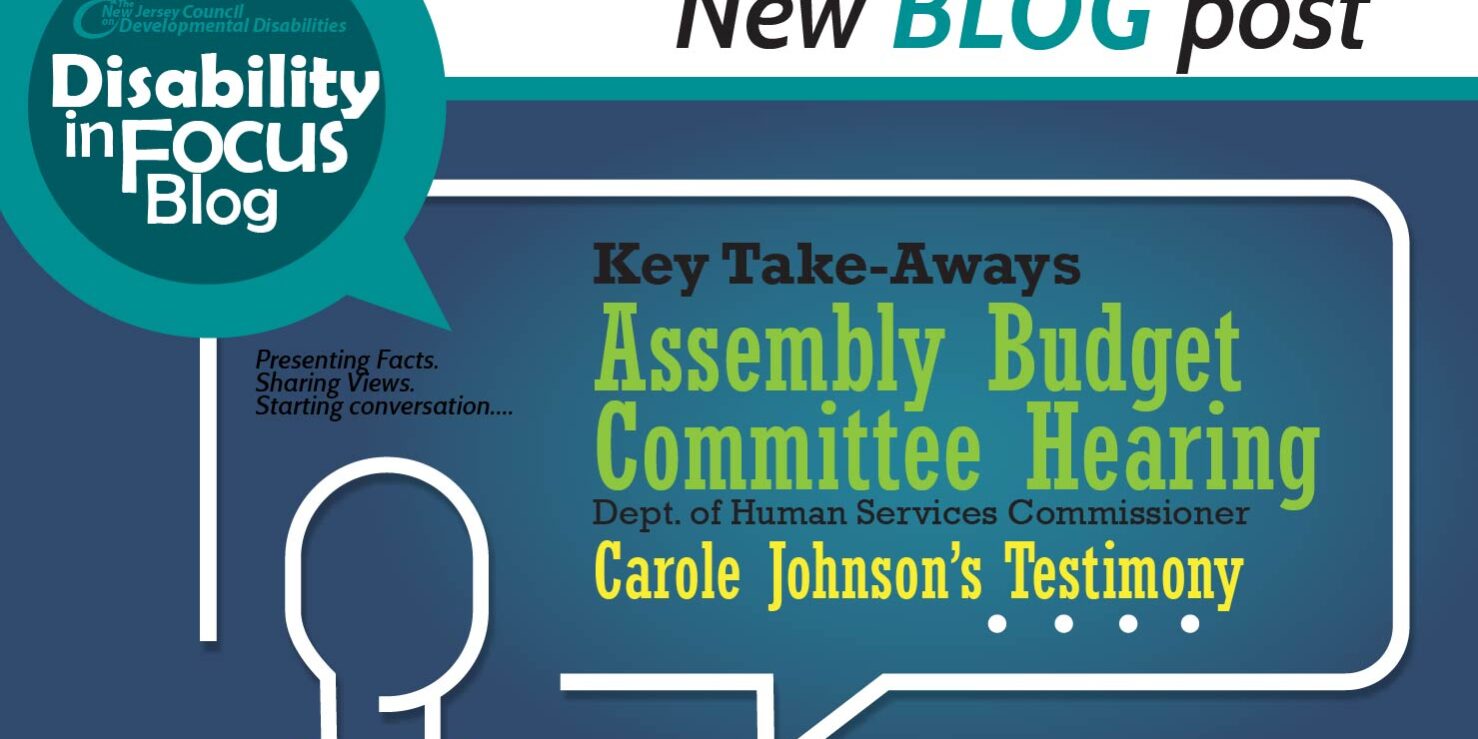The Committee distinguished itself by asking many questions relevant to the I/DD Community’s concerns:
DSP Living Wage Almost all legislators inquired into this issue. As Assemblyman McKeon noted, DSP’s are a vital part of the care system and there is bi-partisan support for upgrading compensation. That’s the best possible news at this point for families and individuals. Vice-Chair Burzichelli’s first question to the Commissioner was about the absence of the $20M for DSP’s in the FY 2019 budget. Assemblyman Benson noted that the medical industry’s costs continue to rise but DSP’s have not been included in these increases and suggested that data must be collected for their compensation rates by DHS. Commissioner Johnson promised to “work with you (the Legislature) on DSP issues” and that Compensation rates are “very important” to DHS.
Medicaid The Commissioner said that Medicaid, thanks to nationwide advocacy, has been preserved intact for the moment. The federal government will pay 93% of Medicaid expansion costs in the coming year. Less certain is the SNAP (Food Stamp) program due to the federal Farm Bill debate. Johnson noted that the great majority of federal funding for the State goes to Medicaid.
Return Home NJ There seems to be much less interest in Return Home NJ by DHS since the law was changed to grandfather many placements out of state. When questioned by a legislator about this, the Commissioner emphasized following the revised guidelines under the new law and that the monitoring and oversight of out of state programs are the priorities.
Protections and Komninos’ Law Commissioner Johnson was asked where statutory protections for people with I/DD are built into the Departmental budget. She expressed appreciation to legislators for those new provisions on unannounced visit, incidence reports, etc. and said that regulations were being put into motion. An update was promised within six months. The State Auditor’s Report on safety recommendations for residents and service recipients (from 2017), she noted, should be applied to background checks nationally, not just statewide.
PPL and Home Care Assemblyman Benson and other characterized the transfer of fiscal intermediary responsibilities to PPL last year as a “huge disruption in services”. Commissioner Johnson said that DHS must “get it right” in order to keep people in their home settings and that steps taken to implement a “Hot Line” to address non-payment issues have been working. Extra staff attention has also been directed to assisting providers and families including extending the Easter Seals contract. The Assemblyman noted that a functional system ultimately saves the State money and the Commissioner agreed that home care is preferable.
Fee for Service Commissioner Johnson revealed that extra funding has been built in to the DHS FY 2019 budget to allow for “shortfalls” due to the uncertainty over fee for service costs and that there is a “Supplemental Budget Process” available as with other services such Ot as for the Aging and for Medicare to ensure that there is enough funding for “essential services”.
Her Comments from the Commissioner- The Department budget includes $109M for upgrading the IT infrastructure, of which 90% will be funded by the federal government. In light of the CASS debacle from several years ago, some legislators wanted to know what assurance there was for a better outcome. The Commissioner said that the upgrades were needed to benefit the Medicaid system and to help as many eligible constituents to enroll through a compatible platform and that she is “all for accountability”
- NJDHS services compare favorably with other states
- There will be no wage reduction for full-time Personal Care Assistants (PCA’s) although some “transitional” staff could be affected
- Institutional care for individuals averages $350,000 per person annually
- The infant mortality rate and child care equal access are shared concerns with communities
- The afterschool wraparound programs are being funded at $67M
- Are savings from de-institutionalization being used for community care programs? (Benson)
- How will the salary mandates from the new CWA contract be met? By the proposed DHS budget or by contractors? (Munoz)
- Would funding for the proposed free community college initiative be better spent on federally-matched programs? (Munoz)
- Is NJ leaving federal $ “on the table”? (DiMaso)
- Provide more clarity on the minimum wage proposals (Marin)
- Will there be any more energy assistance programs? Are hearing assistance supports adequate? (Mukherji and Jones)







